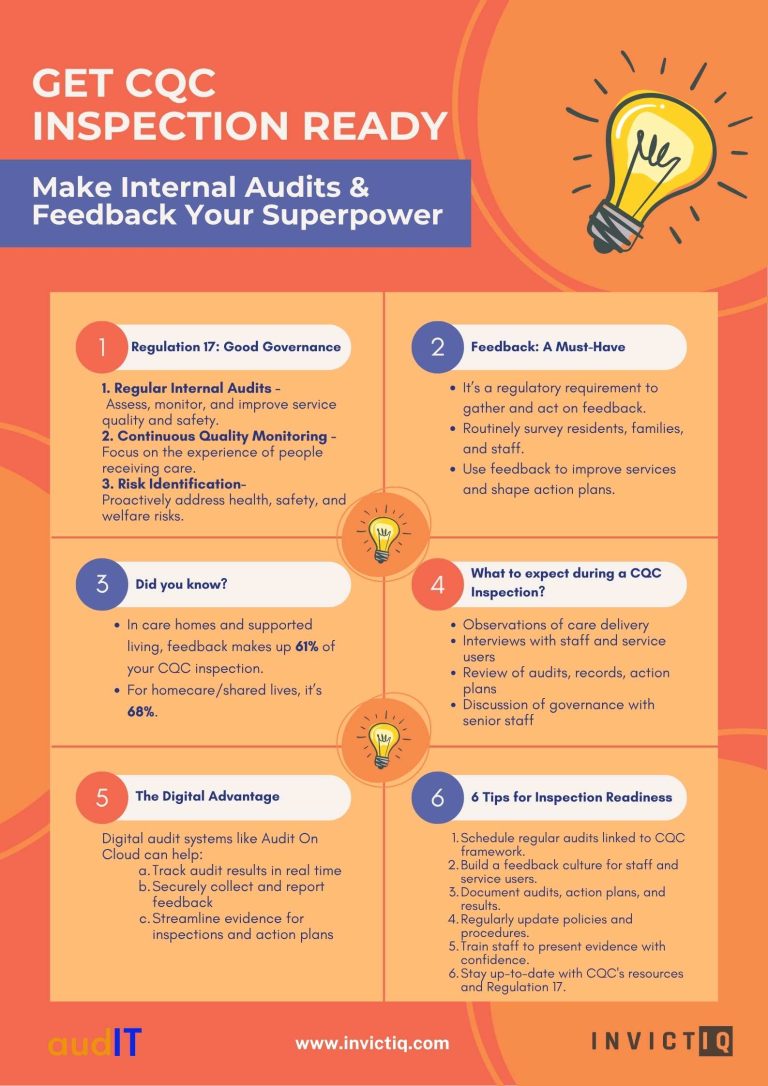@2021 invictIQ is a venture by Sprint Consultancy. All rights reserved. Privacy Policy.

Make Internal Audits & Feedback Your Superpower
by Mark Topps
The change of the CQC Single Assessment framework saw a shift from providers ticking boxes to evidence good quality care to a cultural of continuous improvement with CQC placing a strong emphasis on governance, internal audits and feedback as cornerstones of quality care.
Under Regulation 17: Good Governance of the Health and Social Care Act 2008, providers are required to have effective systems and processes in place to assess, monitor and improve the quality and safety of services. This includes:
- Regular internal audits to evaluate compliance with regulations.
- Monitoring the quality of care and the experience of people being supported.
- Identifying and mitigating risks to health, safety and welfare.
Audits should be structured around the CQC’s five key questions; Is the service safe, effective, caring, responsive and well-led as well as being focused on your organisations policies and procedures as this will enable the audit not only to help identify gaps but also demonstrate to inspectors that the service is proactive in maintaining high standards.
Why Feedback is a Vital Compliance Tool
Feedback isn’t just a formality, it’s a regulatory requirement. CQC expects providers to seek and act on feedback from people using care services, staff and stakeholders to drive improvement. This includes:
- Regular surveys and feedback sessions with residents, patients and families.
- Staff feedback mechanisms to identify operational or cultural issues.
- Using feedback to inform action plans and service development.
As well as the above, during inspections, CQC teams will speak directly with staff and people who use the service to assess how feedback is gathered and used. For care homes and supported living services, feedback makes up 61% of your inspection and within homecare and shared lives, this is 68% of your inspection. Feedback is crucial!
What Happens During a CQC Inspection?
CQC inspections are either comprehensive or focused. Comprehensive inspections assess all five key questions, while focused inspections target specific concerns or changes in service. Inspectors gather evidence through:
- Observations of care.
- Interviews with staff and people who use your care service
- Review of records and audit trails.
- Discussions with senior staff on performance and governance.
Having a robust internal audit system and documented feedback processes can significantly strengthen your position during these inspections and allow you to showcase best practice, lessons learned etc.
How Digital Systems Can Help
Digital systems such as InvictIQ’s Audit On Cloud system are designed to streamline and strengthen internal audit and feedback processes. By enabling real time audit tracking, automated reporting and securing feedback collection, it helps care providers align with the CQC’s Single Assessment Framework and Regulation 17 requirements. Digital systems can simply evidence gathering for inspections but also support with audit outcomes and ensuring feedback is actionable and transparent.
Tips to Get Inspection Ready
- Schedule regular internal audits aligned with CQC’s Single Assessment Framework.
- Create a feedback culture where staff, people who use care services, relatives and professional’s users feel heard. Utilise this feedback and act on it.
- Document everything, from audit findings to action plans and outcomes.
- Review and update policies regularly to reflect best practices and regulatory changes.
- Train staff on inspection expectations and how to present evidence confidently.
- Familiarise yourself with the CQC ‘What we do on an inspection’ resource which you can find here: What we do on an inspection – Care Quality Commission
- Familiarise yourself with the CQC Single Assessment Framework, with focus on Regulation 17, Good Governance which you can find here: Regulation 17: Good governance – Care Quality Commission
Being inspection ready is not a one-off task but a continuous journey. By embedding internal audits and feedback into our services and culture, we are not only able to meet regulatory expectations but also foster a culture of excellence and accountability.
MORE ARTICLES

Mark Topps is a social care leader who has worked in the care industry since 2004 and is currently working as a regional support manager. He regularly advocates, appearing on television, radio and podcasts and has started many campaigns for change in legislation and culture within the industry. Mark is the co-founder of The Caring View which is a social care podcast, YouTube show and free resource initiative for the sector. He also co-founded The Health and Social Care Club, which is an audio event hosted on LinkedIn. Mark is also the social media and marketing director at the National Association of Care and Support Workers.
Sign up for our newsletter

